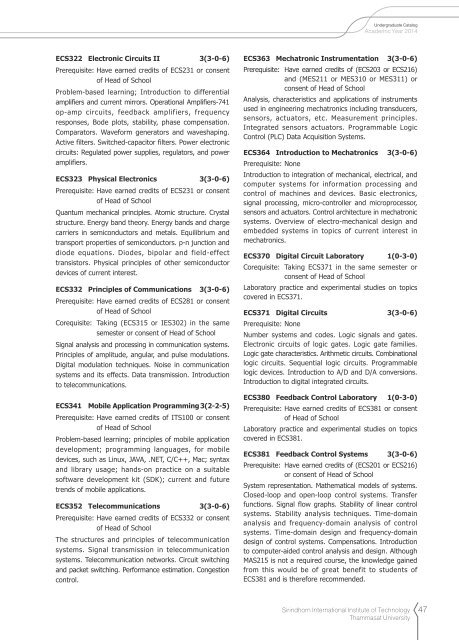undergrad2014
undergrad2014
undergrad2014
Create successful ePaper yourself
Turn your PDF publications into a flip-book with our unique Google optimized e-Paper software.
ECS322 Electronic Circuits II<br />
3(3-0-6)<br />
Prerequisite: Have earned credits of ECS231 or consent <br />
of Head of School<br />
Problem-based learning; Introduction to differential<br />
amplifiers and current mirrors. Operational Amplifiers-741<br />
op-amp circuits, feedback amplifiers, frequency<br />
responses, Bode plots, stability, phase compensation.<br />
Comparators. Waveform generators and waveshaping.<br />
Active filters. Switched-capacitor filters. Power electronic<br />
circuits: Regulated power supplies, regulators, and power<br />
amplifiers.<br />
ECS323 Physical Electronics<br />
3(3-0-6)<br />
Prerequisite: Have earned credits of ECS231 or consent <br />
of Head of School<br />
Quantum mechanical principles. Atomic structure. Crystal<br />
structure. Energy band theory. Energy bands and charge<br />
carriers in semiconductors and metals. Equilibrium and<br />
transport properties of semiconductors. p-n junction and<br />
diode equations. Diodes, bipolar and field-effect<br />
transistors. Physical principles of other semiconductor<br />
devices of current interest.<br />
ECS332 Principles of Communications<br />
3(3-0-6)<br />
Prerequisite: Have earned credits of ECS281 or consent <br />
of Head of School<br />
Corequisite: Taking (ECS315 or IES302) in the same <br />
semester or consent of Head of School<br />
Signal analysis and processing in communication systems.<br />
Principles of amplitude, angular, and pulse modulations.<br />
Digital modulation techniques. Noise in communication<br />
systems and its effects. Data transmission. Introduction<br />
to telecommunications.<br />
ECS341 Mobile Application Programming 3(2-2-5)<br />
Prerequisite: Have earned credits of ITS100 or consent <br />
of Head of School<br />
Problem-based learning; principles of mobile application<br />
development; programming languages, for mobile<br />
devices, such as Linux, JAVA, .NET, C/C++, Mac; syntax<br />
and library usage; hands-on practice on a suitable<br />
software development kit (SDK); current and future<br />
trends of mobile applications.<br />
ECS352 Telecommunications<br />
3(3-0-6)<br />
Prerequisite: Have earned credits of ECS332 or consent <br />
of Head of School<br />
The structures and principles of telecommunication<br />
systems. Signal transmission in telecommunication<br />
systems. Telecommunication networks. Circuit switching<br />
and packet switching. Performance estimation. Congestion<br />
control.<br />
ECS363 Mechatronic Instrumentation<br />
3(3-0-6)<br />
Prerequisite: Have earned credits of (ECS203 or ECS216)<br />
and (MES211 or MES310 or MES311) or <br />
consent of Head of School<br />
Analysis, characteristics and applications of instruments<br />
used in engineering mechatronics including transducers,<br />
sensors, actuators, etc. Measurement principles.<br />
Integrated sensors actuators. Programmable Logic<br />
Control (PLC) Data Acquisition Systems.<br />
ECS364 Introduction to Mechatronics<br />
Prerequisite: None<br />
3(3-0-6)<br />
Introduction to integration of mechanical, electrical, and<br />
computer systems for information processing and<br />
control of machines and devices. Basic electronics,<br />
signal processing, micro-controller and microprocessor,<br />
sensors and actuators. Control architecture in mechatronic<br />
systems. Overview of electro-mechanical design and<br />
embedded systems in topics of current interest in<br />
mechatronics.<br />
ECS370 Digital Circuit Laboratory<br />
1(0-3-0)<br />
Corequisite: Taking ECS371 in the same semester or <br />
consent of Head of School<br />
Laboratory practice and experimental studies on topics<br />
covered in ECS371.<br />
ECS371 Digital Circuits<br />
Prerequisite: None<br />
3(3-0-6)<br />
Number systems and codes. Logic signals and gates.<br />
Electronic circuits of logic gates. Logic gate families.<br />
Logic gate characteristics. Arithmetic circuits. Combinational<br />
logic circuits. Sequential logic circuits. Programmable<br />
logic devices. Introduction to A/D and D/A conversions.<br />
Introduction to digital integrated circuits.<br />
ECS380 Feedback Control Laboratory<br />
1(0-3-0)<br />
Prerequisite: Have earned credits of ECS381 or consent <br />
of Head of School<br />
Laboratory practice and experimental studies on topics<br />
covered in ECS381.<br />
ECS381 Feedback Control Systems<br />
3(3-0-6)<br />
Prerequisite: Have earned credits of (ECS201 or ECS216)<br />
or consent of Head of School<br />
System representation. Mathematical models of systems.<br />
Closed-loop and open-loop control systems. Transfer<br />
functions. Signal flow graphs. Stability of linear control<br />
systems. Stability analysis techniques. Time-domain<br />
analysis and frequency-domain analysis of control<br />
systems. Time-domain design and frequency-domain<br />
design of control systems. Compensations. Introduction<br />
to computer-aided control analysis and design. Although<br />
MAS215 is not a required course, the knowledge gained<br />
from this would be of great benefit to students of<br />
ECS381 and is therefore recommended.<br />
Sirindhorn International Institute of Technology<br />
Thammasat University<br />
47


